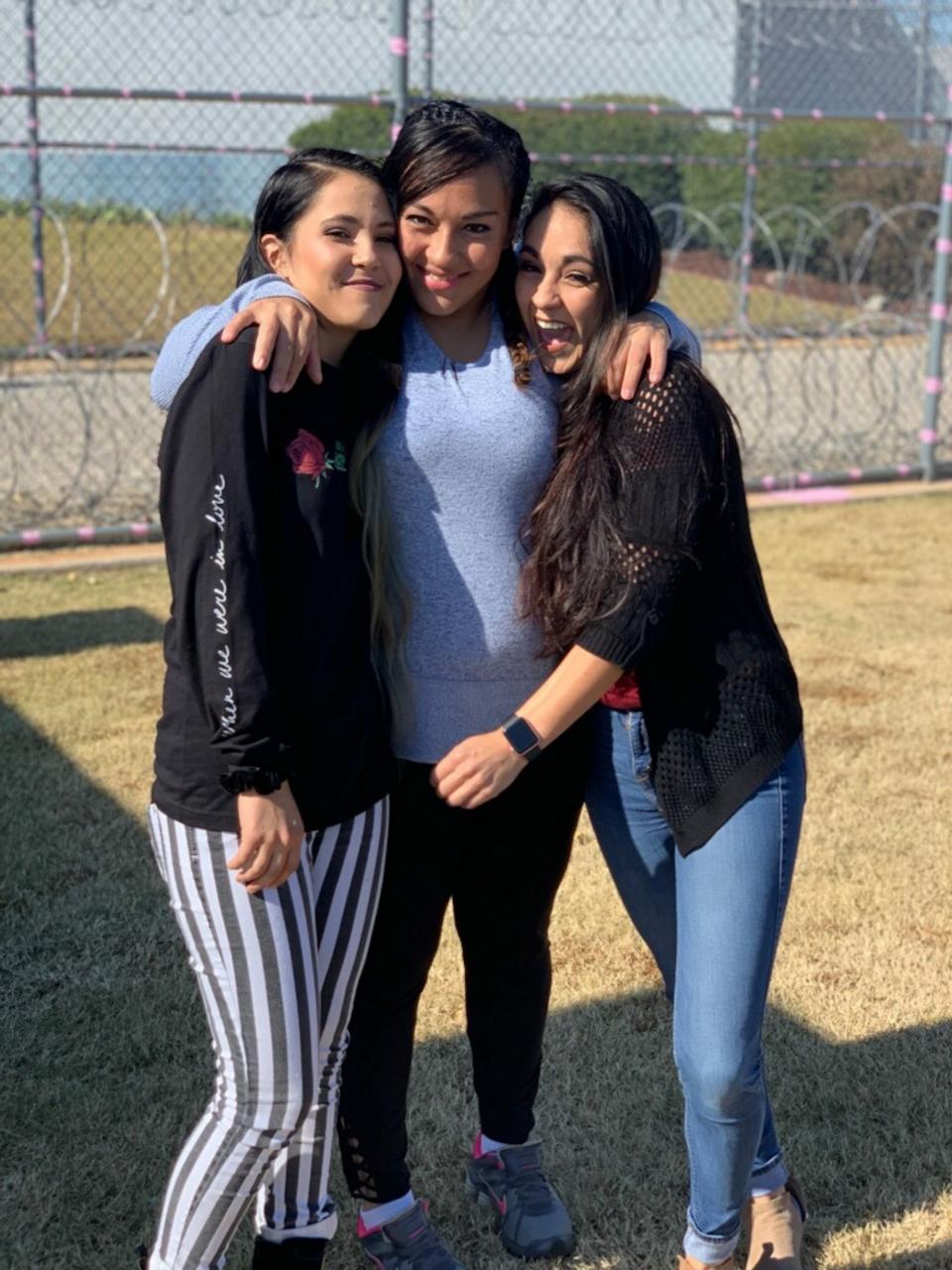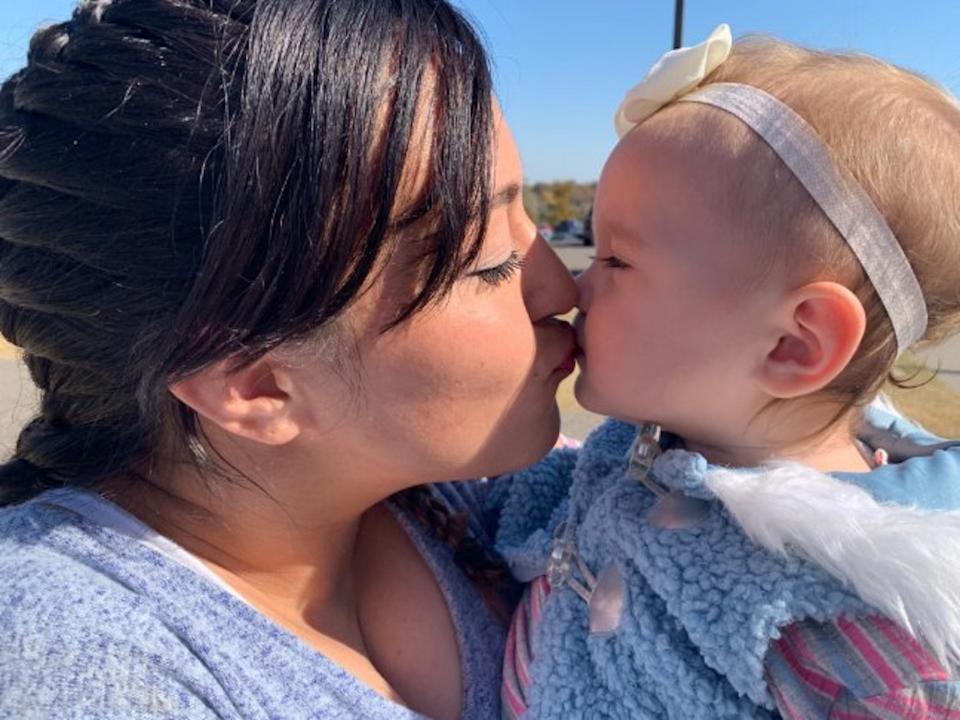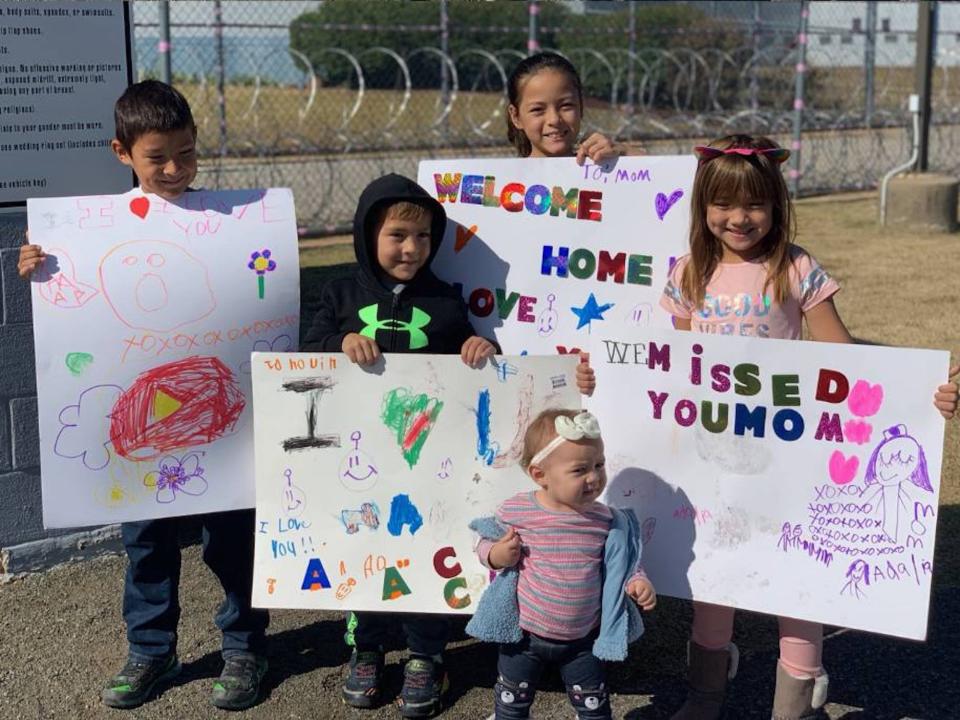A woman who was part of Oklahoma's mass release of 462 inmates says 'there's more drugs in prison than there is on the streets', and if you can stay clean inside, you can thrive outside
Sue Ogrocki/AP
More than 450 inmates were released from Oklahoma prisons on Monday in the largest single-day mass commutation in US history.
The prisoners were released after Gov. Kevin Stitt signed a bill into law that downgraded low-level drug and property crimes to misdemeanors.
Calista Ortiz, 26, was one of the prisoners released on Monday, and she told Insider the story of what it was like to be part of the historic moment.
In January 2016, Calista Ortiz lost a son to sudden infant death syndrome and started doing meth.
About a year later, Ortiz — who didn't know she was a few days pregnant at the time — was arrested for drug possession and sentenced to seven-and-a-half years in prison in Oklahoma.
Separated from her infant daughter shortly after giving birth and facing nearly a decade behind bars, it would be understandable if Ortiz felt defeated. But she focused instead on earning her GED and getting a forklift certification. And now her hard work is paying off.
On Saturday, Calista learned that she would be part of the group of more than 450 inmates being released early in the largest single-day commutation in US history.

Courtesy of Calista Ortiz
The commutations stemmed from a measure voters passed in 2016 that made simple drug possession a misdemeanor and increased felony property crimes from $500 to $1,000, according to the Oklahoman.
Gov. Kevin Stitt signed new legislation this year that made these definitions retroactive, meaning that inmates like Ortiz, who were already serving sentences for these crimes, could be eligible for early release for time served.
'It was just all I could to at the time to cope'
Ortiz was arrested in December 2017, when she was caught doing meth at a friend's house.
She said she started doing drugs again when a friend of a relative offered her some at her son's funeral. She said it wasn't her first time, but at that point she was sober and focusing on being a mother.
"This woman came into my life and she thought she was doing me a favor by putting drugs in my purse. I can't explain what it's like to lose a child. I'm not making excuses for why I did drugs, but it was just all I could to at the time to cope," Ortiz told Insider.
She didn't know it at the time of her arrest, but Ortiz was just a few days pregnant — something she would learn while she was in county jail awaiting trial.
When she was convicted and sentenced to seven-and-a-half years in prison on February 1, 2018, she was sent to Mabel Bassett prison outside Oklahoma City, which has a hospital ward and is home to a mixture of minimum and maximum-security prisoners. It was there that she gave birth to her daughter, Cienna, in August 2018.

Courtesy of Calista Ortiz
Since then, Ortiz has only seen her daughter about six times, since her family lives in Texas and couldn't visit often.
"It was best that way because it's really hard having visits and having to leave," she said. "So I've seen her periodically but not that often."
One of the lucky ones
Ortiz said she was aware of the new law going into her prison sentence, and that she worked hard to be petition for early release. She said that on September 17, she received a letter saying she was part of a group being considered for a commuted sentence, but didn't let herself get her hopes up since she had already been denied a few times already.
Then, on Saturday, she got final word that she had been approved. She was excited, but the mood at her prison may not have been as joyful as others since it wasn't strictly minimum security inmates. She said of the about 1,600 women held at the prison, she was part of a class of only 15 who were approved for early release on Monday.

Courtesy of Calista Ortiz
In the two days before her release, Ortiz attended a special fair for the prisoners who were getting out early, which included booths to network for jobs and to learn about what resources would be available to them on the outside.
"The governor was there and gave us an encouraging speech and just told us that he was fighting for us and he wanted to us do good and to take advantage of whatever resources that we could," she said.
Her whole family came to welcome her out
Ortiz said she packed up on Sunday and then rushed to the visitation room at 8 a.m. the next day to wait until 11 a.m., when her family had been told to come and pick her up.
"So at 11 o'clock, when they brought the clothes for me to change into, it was just like ... I was so anxious and excited and I was shaking and I ran in there and changed my clothes. It seemed like it took forever to do the discharge paperwork but it only took a few minutes I'm sure," she said.
Waiting outside was 16 members of her family, who had caravanned up to Oklahoma in multiple vehicles.

Courtesy of Calista Ortiz
"My children had signs that they made for me and it was just, it was really great. It was so exciting and the whole time I felt like it wasn't real. Until I walked out the gates and I'd seen them and I was like, 'Oh my gosh, this is really it.' I mean, still it feels surreal to me. I'm like sitting here and I'm just like, 'Wow, there's no barbed wire fences around me,'" Ortiz said.
After that, they got lunch at a buffet where Ortiz was overwhelmed by the amount of food. She said she was strangely excited to use a real fork again after using plastic sporks for so long.
A new start
Now that she's back at home with her husband and five kids, Ortiz said she "definitely" wants to go to college and help others who have lived through similar experiences. While she was locked up, she got her GED, was trained to operate a forklift, and is OSHA certified. She also already filled out her financial aid forms to make starting college easier.
"Getting locked up was terrible and I wouldn't wish that on anybody, but it's what it took for me to face my loss sober and deal with it in a healthy way and ... just come to terms with some of the things and get myself straight and sit back and figure out what I want in life and what I want to do," she said.
"And so I feel like my calling is to ... maybe be a mental health professional or in some kind of field where I can help other people who have been through traumatic experiences that led to drug abuse."

AP
She said she believes in what Gov. Stitt is doing, giving prisoners second chances, and took issue with the critics who said she and the other former inmates are just going to land themselves back in jail soon.
"He's not just letting everybody out," she said, adding that she saw first-hand some of the people who got turned down for early release. "There's people who didn't make it and they're the people who were failing drug tests and have so many misconducts."
"There's more drugs in prison than there is on the streets," she added. "It's so much easier to get in trouble in there, than it is out here. So if you're able to be strong and do good while you're in there, you can definitely make it out here."
Read more:
NOW WATCH: Why Hometown Bar-B-Que is the most legendary barbecue restaurant in NYC

